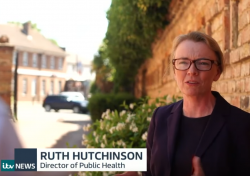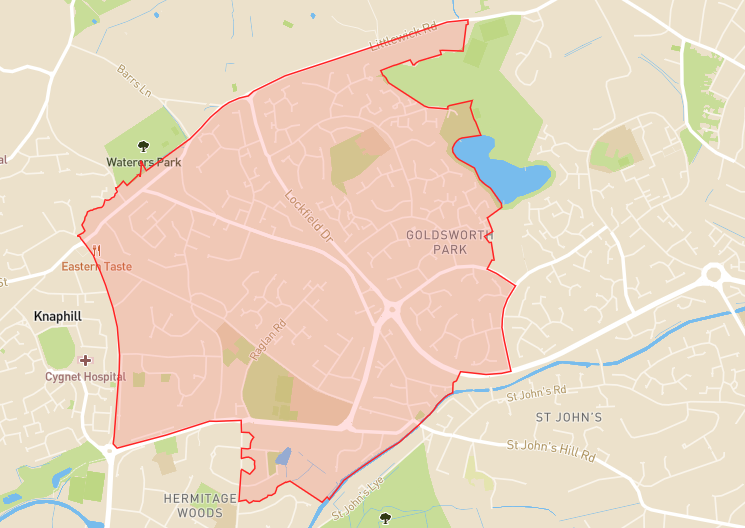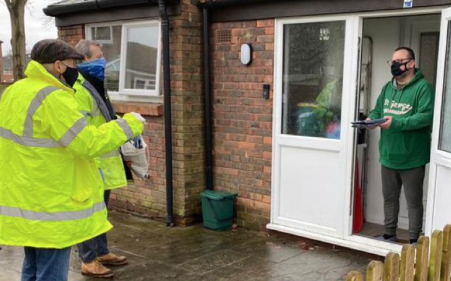 Abraham Lincoln
If given the truth, the people can be depended upon to meet any national crisis...
Abraham Lincoln
If given the truth, the people can be depended upon to meet any national crisis...
 Guildford news...
for Guildford people, brought to you by Guildford reporters - Guildford's own news service
Guildford news...
for Guildford people, brought to you by Guildford reporters - Guildford's own news service
‘Surge-testing’ For Covid SA Variant After Cases Detected in Woking
Published on: 1 Feb, 2021
Updated on: 2 Feb, 2021
local democracy reporter
and Martin Giles
The Secretary of State for Health, Matt Hancock has said it is “critical” that people in areas singled out for enhanced testing for the South African variant stay at home.
He told MPs those in affected postcodes should only go out when “absolutely essential”.
It was announced that the South African variant of coronavirus had been detected in Surrey on Monday (February 1). The positive test results came from Goldsworth Park and St John’s in Woking (centred on GU21 8UB postcode district, according to Surrey Police).
None of the three residents has recently travelled abroad or has links to previous variant cases.
Earlier a government minister has said that those in the testing area should further limit the time they spend away from home.
Universities minister Michelle Donelan said those affected should be “thinking twice about their actions”.
Woking Borough Council says on its website that residents do not need to self-isolate unless they have symptoms, have tested positive and/or been in contact with someone who has tested positive and been contacted by Test and Trace.
And those in the affected area and across Woking, should, “remain calm and continue to follow the national restrictions that are currently in place”.
Echoing the Secretary of State’s words WBC advise affected residents, “The best way to stop the spread of the virus is to wash your hands, wear a face covering and keep your distance from others. Whilst in lockdown, it is important that we also stay at home unless it is absolutely essential to go out.”
Ruth Hutchinson, Surrey’s public health director, said on Monday: “There is no evidence this variant causes more severe illness, so you don’t need to worry.”
A team coordinated by Surrey Local Resilience Forum (SLRF) will be visiting door-to-door in the next couple of days (February 1 and 2), offering PCR tests to about 9,000 people in the Woking areas.
 They have been working over the weekend with Public Health England and the Department of Health and Social Care to mobilise local “surge-testing”, helped by Woking Borough Council volunteers, who will carry ID.
They have been working over the weekend with Public Health England and the Department of Health and Social Care to mobilise local “surge-testing”, helped by Woking Borough Council volunteers, who will carry ID.
SLRF is hoping everyone aged 18 and over in the affected areas will cooperate with the testing, whether or not they have symptoms.
This will enable close monitoring of any community spread of the new variant and restrict further transmission, working closely with PHE, NHS Test and Trace and the Joint Biosecurity Centre.
“This is a precautionary measure,” Ms Hutchinson said. “The more cases of the variant we find, the better chance we have at stopping it spreading.
“By playing your part and taking the test, you’ll be helping to keep your community and your loved ones safe.”
The three variant cases were detected through genomic sequencing after samples of positive coronavirus test results were sent in.
Dr Alison Barnett, regional director at Public Health England South East, said: “The UK has one of the best genomic systems in the world which has allowed us to detect the variant originating in South Africa here in Surrey.
“I urge everyone offered a test to take it to help us monitor the virus in our communities and to help suppress and control the spread.”
She added: “The most important thing is that people continue to follow the guidance; limit your number of contacts, wash your hands regularly and thoroughly, keep your distance and cover your face. If you test positive by any method, you must isolate to stop the spread.”
Woking is among eight UK areas where surge-testing is being mounted.
As of Saturday (January 30), 105 cases of the South African variant, known as VOC-202012/02, had been identified across the UK. Eleven cannot be linked to South Africa. Mutations appear as the virus makes new copies of itself in an attempt to spread and thrive.
The extent to which the regulated vaccines protect against it is not yet known.
How does the testing work in practice?
PCR (polymerase chain reaction) tests, which involve swabs of the throat and nose, check for the genetic material (RNA) of the virus in a laboratory and the result is returned by text or email within one to three days.
The Woking tests are specifically genome-sequenced for the variant, so they should be taken even by those who have had PCR tests.
Anyone testing positive, or anyone with symptoms while awaiting results (such as a high temperature, a new and persistent cough or a loss or change to sense of smell or taste), should self-isolate for at least 10 days from when symptoms started.
Those with questions can call the Surrey Community Helpline 0300 200 1008 Monday-Friday 9am-5pm, weekends 11am-3pm. Deaf and hearing-impaired residents can text 0786 0053 465, Monday-Friday 9am-5pm.
This article will be updated as new information is made available. Please check back.
Recent Articles
- Pie & Mash on Box Hill If Parking Can Be Sorted
- Notice: The Welcoming Committee for Hong Kongers
- Letter: This Shows Why Councils Should Not Dabble in Property Investment
- GBC Dismisses Fears That New Ash Road Bridge Will Cause Traffic ‘Bottleneck’
- Marking Holocaust Memorial Day 2025 at the Surrey History Centre
- Surrey Councils Call on Residents to Recycle All Their Food Waste
- Windfall Grant Allows High Street Redevelopment Project to Proceed
- New Crossing at Burpham
- Young Councillor Quits Tories for Reform
- Surrey Police Crackdown Shows Serious Rise In Drug-Driving


Search in Site
Media Gallery
Dragon Interview: Local Artist Leaves Her Mark At One of England’s Most Historic Buildings
January 21, 2023 / No Comment / Read MoreDragon Interview: Lib Dem Planning Chair: ‘Current Policy Doesn’t Work for Local People’
January 19, 2023 / No Comment / Read MoreA3 Tunnel in Guildford ‘Necessary’ for New Homes, Says Guildford’s MP
January 10, 2023 / No Comment / Read More‘Madness’ for London Road Scheme to Go Ahead Against ‘Huge Opposition’, Says SCC Leader
January 6, 2023 / No Comment / Read MoreCouncillor’s Son Starts Campaign for More Consultation on North Street Plan
December 30, 2022 / No Comment / Read MoreCounty Council Climbs Down Over London Road Works – Further ‘Engagement’ Period Announced
December 14, 2022 / No Comment / Read MoreDragon Interview: GBC Reaction to the Government’s Expected Decision to Relax Housing Targets
December 7, 2022 / No Comment / Read MoreHow Can Our Town Centre Businesses Recover? Watch the Shop Front Debate
May 18, 2020 / No Comment / Read More















Recent Comments